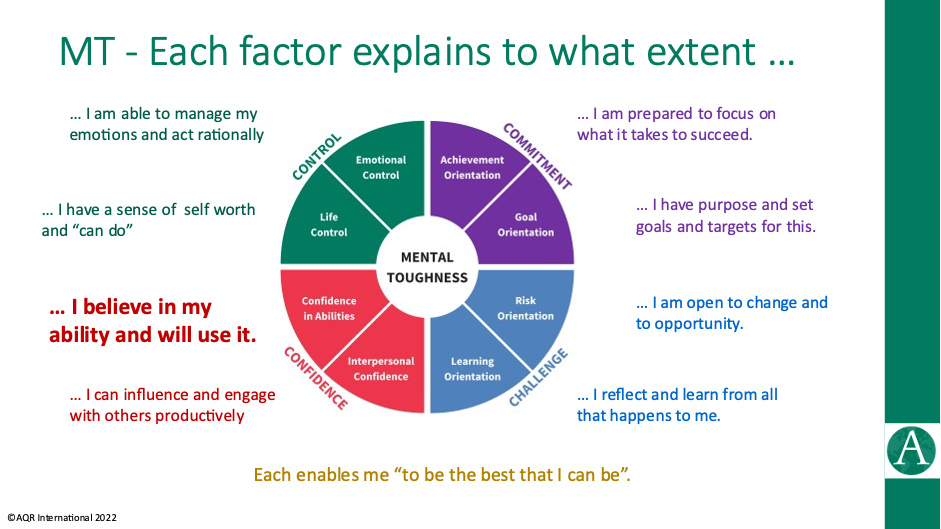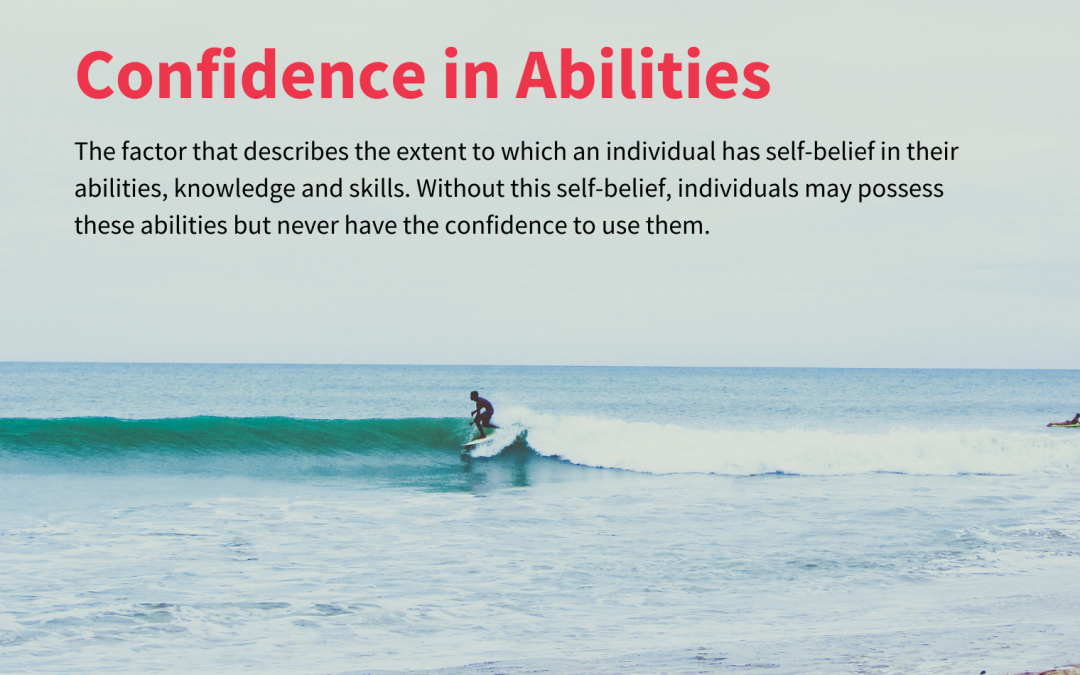Confidence in Abilities is the seventh in a series of posts about the eight factors that form the mental toughness concept which is a personality trait that describes our mental responses, how we think, to stressors, challenges and opportunities and is a major influence on behaviour – how we act.
Confidence in Abilities is one of the two factors that contribute to our overall sense of Confidence – that self-belief in our capabilities to be able to deal with whatever comes our way. This factor describes the extent we believe in our skills, knowledge, experiences etc in a way that encourages us to use them.
An aspect of self-esteem, it is possible to be very talented and yet doubt this. The more mentally tough will believe that they are capable of doing many things; others may not ….. even if they are equally talented and skilled.
This explains why two people, who are equivalent in many ways, will respond differently when asked to carry out the same task. One will say “I know how to do that, I am up for it”. The other will say “I know I have been shown how to do it, but I think I don’t know enough (or others can do it better) even though they do know enough”.
The difference lies in their respective mental approaches.
“Life is not easy for any of us. But what of that? We must have perseverance and above all confidence in ourselves. We must believe that we are gifted for something, and that this thing must be attained.” - Marie Curie
Together with Life Control (described in another article), this factor captures the idea of self-efficacy. – I can do it because I believe in myself AND my abilities.
This factor, like all the factors, is a spectrum with mental sensitivity at one end and mental toughness at the other. It is not a black and white idea – there are many shades in between. In fact, around 70% of a population will have mental responses that reflect elements of both.
And, although each factor is independent of the other 7, the ways they can interplay matter in that they give rise to different outcomes – at least 40,000 possible combinations.
So, even two people, who are similar in terms of Confidence in Abilities, might differ in what they do if one has a high level of, say, Emotional Control (will maintain poise when taking on hard tasks that they know they can do) and the other has a low level (and will respond emotionally when difficulties arise)
This illustrates that personality is complex and nuanced and how the mental toughness concept (and the MTQPlus) measure can bring that nuance to the practitioner.
“Trust yourself–you know more than you think you do.” – Benjamin Spock
This image helps us to get an insight into this. Think about how different levels of Life Control might result in different outcomes with different levels of the other seven factors.

There is another layer of complexity to consider. All things being equal, being more mentally tough will give an advantage to the individual. But not always.
It is perfectly possible for a mentally tough person to struggle and for the more mentally sensitive to thrive. Self-awareness about this invisible mental response matters here.
If self-aware of one’s level of mental toughness, one can either develop it or one can adopt practices that help to compensate for the level of sensitivity.
This is the essence of coaching. Understanding what makes you tick and what gets in the way.
How can a mentally tough person struggle? This sense of self-belief can make them believe they have abilities they don’t have; they can take on too much; they can be dismissive of other’s abilities and appear arrogant; they can believe they are right – when they are wrong. In extremis, they can be painfully narcissistic.
What are the positives for a more mentally sensitive person in terms of Confidence in their Abilities? They don’t jump into a task without first checking they can do it. They can be very realistic about their (and other’s) ability as a person to take on tasks. They can be effective in recognising other’s abilities and can be effective team players.
This degree of nuance is true for all eight factors and all interplay with one another. The mental toughness concept provides a lens through which people can be supported to look at themselves and understand exactly where their development needs might lie.
This illustrates that the mental toughness concept is about differences and not about “good or bad” or labelling people as types or colours. Enabling development to be customised in a way that isn’t yet normal practice. We know that “one size fits all” approaches generally fail and can do more harm than good. *
Assessment is a challenge. Because the factors are invisible and any one, or combination of factors, can explain behaviour or wellbeing outcome, it can be difficult to assess a mental toughness profile with a realistic level of confidence. A by-product of the research behind the concept has resulted in the development of a reliable and valid psychometric measure.
The mental toughness concept and the MTQPlus measure represent a real advance in our understanding of individuals (and organisations). For practitioners who are engaged in developing people and organisations, understanding mental toughness goes beyond CPD. It should really be part of their armoury.
Like the image used in this post on Confidence in Abilities and others in our ‘Eight Factors’ series? A set of downloadable posters are available here.

Doug Strycharczyk 2023


